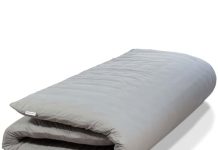Curiosity piqued, we couldn’t help but wonder: are floor mattresses firmer or softer than regular mattresses? This burning question sparked our interest, and we investigated the often-debated topic.
In our quest for answers, we explored the characteristics and benefits of floor mattresses and their traditional counterparts. We aimed to shed light on the peculiar properties that define these alternative sleeping surfaces. Prepare to unravel the captivating secrets behind the comfort levels of floor mattresses as we embark on an enlightening journey toward a better understanding of this fascinating subject.
Review contents
Types of Mattresses
Regular Mattresses
Regular mattresses are the traditional and most commonly used type of mattresses. They are designed to be placed on a bed frame or foundation, providing a comfortable and elevated sleeping surface. Regular mattresses come in various sizes, ranging from twin to king, and offer various features and options, including materials, firmness levels, and support systems.
Floor Mattresses
On the other hand, floor mattresses, also known as Japanese futons or roll-up mattresses, are designed to be placed directly on the floor. They originated in Japan and have gained popularity worldwide due to their minimalist design and portability. Floor mattresses are typically thinner and more compact than regular ones, allowing for easy storage and use in smaller spaces.
Materials Used
Regular Mattresses
Regular mattresses can be made of various materials, including innerspring, memory foam, latex, or a combination. Innerspring mattresses contain supportive coils or springs, while memory foam mattresses are viscoelastic foam that molds to the body’s shape. Latex mattresses use natural or synthetic latex for responsive support and pressure relief.
Floor Mattresses
Floor mattresses are typically made of layers of natural or synthetic fibers, such as cotton, wool, or polyester, encased in a removable cover. These materials provide a comfortable and breathable surface for sleeping directly on the floor. Using natural fibers in floor mattresses can enhance their breathability and moisture-wicking properties, making them suitable for different climates.
Firmness Level
Regular Mattresses
Regular mattresses come in a wide range of firmness levels, from soft to firm. The firmness level often depends on the materials used and the preferences of the individual sleeper. Soft mattresses provide a plush and cushioned feel, while firm mattresses offer more support and can benefit those with back or joint pain. Medium firmness is usually the most versatile option, balancing comfort and support.
Floor Mattresses
Floor mattresses tend to be firmer compared to regular mattresses. This is mainly because the absence of a bed frame or foundation means that the mattress directly rests on the floor, which can provide a more solid and supportive surface. The firmer feel of floor mattresses can benefit individuals who prefer a sturdier sleeping surface or require additional support for their back or joints.
Support
Regular Mattresses
Regular mattresses offer support systems for proper spinal alignment and pressure point relief. Innerspring mattresses have coils that distribute weight evenly and provide targeted support. Memory foam mattresses contour to the body’s shape and help alleviate pressure points. Latex mattresses offer responsive support that conforms to the body without sinking too much. The support system of a regular mattress can significantly impact the overall comfort and quality of sleep.
Floor Mattresses
While floor mattresses may not have a structured support system like regular mattresses, they can still provide ample support for a restful night’s sleep. The firm and even surface of the floor, combined with the layers of supportive materials in floor mattresses, can help maintain proper spinal alignment. However, it’s important to note that individuals with specific support needs, such as those with chronic back pain, may require additional support. They should consider using a regular mattress or adding a mattress topper for extra cushioning.
Comfort
Regular Mattresses
Regular mattresses are designed with comfort in mind, offering a range of features to enhance the sleeping experience. The materials, such as memory foam or latex, can provide a plush and contouring feel. Additionally, regular mattresses often have additional comfort layers, such as pillow tops or Euro tops, that add extra cushioning and softness. The combination of supportive and comfortable materials in regular mattresses aims to balance support and pressure relief for a restful night’s sleep.
Floor Mattresses
While floor mattresses may not provide the same plushness and cushioning as regular mattresses, they can still offer a comfortable sleeping surface. The compact and thin design of floor mattresses provides a firmer feel, which some individuals may find supportive and comfortable. Furthermore, the lack of a bed frame or foundation can result in a closer connection to the ground, providing some people with a unique sleeping experience and a sense of grounding.
Durability
Regular Mattresses
Regular mattresses are designed to withstand regular use and can have a longer lifespan than floor mattresses. The durability of a regular mattress depends on factors such as the quality of materials used, construction techniques, and overall care. Higher-quality mattresses with durable materials, such as high-density foam or high-gauge steel coils, will likely last longer and maintain their shape and support over time.
Floor Mattresses
Although versatile and lightweight, floor mattresses may have a shorter lifespan than regular mattresses. Direct contact with the floor can increase wear and tear, especially if the surface is rough or uneven. However, proper care and maintenance, such as regular flipping and rotating, can help prolong the lifespan of a floor mattress. Additionally, the portable nature of floor mattresses makes them easy to replace or upgrade when needed.
Price Range
Regular Mattresses
Regular mattresses come in a wide price range, depending on size, brand, materials, and features. Entry-level mattresses can start as low as $200, while high-end luxury mattresses can cost several thousand dollars. When considering a regular mattress purchase, balance affordability, and the desired features and quality.
Floor Mattresses
Floor mattresses are generally more affordable compared to regular mattresses. Their more straightforward design and use of more basic materials contribute to their lower price range. While floor mattresses can be found for as low as $100, higher-quality options or those made with natural fibers may have a slightly higher price tag. Floor mattresses offer a budget-friendly alternative for those seeking a minimalist sleeping solution.
Maintenance
Regular Mattresses
Regular mattresses typically require some maintenance to ensure their longevity and hygiene. This includes regular rotating and flipping of the mattress to distribute wear and pressure evenly, as well as vacuuming or spot cleaning to remove dust, stains, or allergens. A mattress protector can also help prevent spills, stains, and allergens from penetrating the mattress, keeping it clean and extending its lifespan.
Floor Mattresses
Floor mattresses are generally easier to maintain compared to regular mattresses. Their simplicity and lack of complex structures make them less susceptible to issues like sagging or developing lumps. However, it is still important to regularly air out and spot clean floor mattresses to keep them fresh and dust-free. Removable and washable covers are also available for many floor mattresses, making them easier to clean and maintain.
Health Considerations
Regular Mattresses
Regular mattresses can have various health considerations depending on individual needs and preferences. For individuals with specific health concerns, such as back pain or allergies, choosing a mattress that provides adequate support and is hypoallergenic can be beneficial. Regular mattresses made with CertiPUR-US-certified foams or eco-friendly materials can contribute to a healthier sleep environment.
Floor Mattresses
Floor mattresses can also have health considerations, particularly for individuals with back or joint pain. The firmer surface of a floor mattress can provide better support for the spine and alleviate pressure points, promoting proper alignment. However, individuals with existing musculoskeletal conditions or those who require a more cushioned surface may find regular mattresses or mattress toppers more suitable for their needs.
Conclusion
In conclusion, regular and floor mattresses have unique features and considerations. Regular mattresses offer various options regarding materials, firmness levels, support systems, and overall comfort. They provide a more elevated and customizable sleeping surface, catering to individual preferences and health needs.
On the other hand, floor mattresses offer a minimalist and portable sleeping solution. They are generally firmer and more affordable than regular mattresses, making them suitable for those who prefer a solid and supportive surface or are looking for a budget-friendly option. However, they may not provide the same plushness and customization as regular mattresses.
Ultimately, choosing between regular and floor mattresses depends on individual preferences, health considerations, and the desired sleeping experience. It is essential to carefully evaluate each type of mattress’s features, materials, support, and comfort levels to make an informed decision that suits your specific needs.
Whether you opt for the traditional comfort of regular mattresses or the simplicity of floor mattresses, prioritizing your sleep quality and overall well-being is the most critical aspect.



























